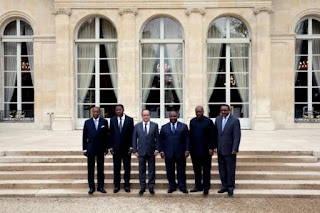Friday, February fourteenth, the UN says at least 22 people have been killed in a village in the Northwest region of Cameroon. Over half of those killed were children. No one has claimed responsibility for Friday’s incident but the opposition parties blame the killing on the government.
French policy shift leaves Gabon's Ali Bongo out in the cold
- Get link
- Other Apps
In the heyday of former President Omar Bongo, Gabon and its oil wealth were a central pillar of "La Francafrique", a shadowy network that enabled France's troops to defend African autocrats in exchange for juicy contracts for French companies.
Thanks
partly to this web of diplomacy and trade backed by French firepower, Bongo
stayed in office for 42 years before his death in 2009. France's energy firms,
meanwhile, had undisputed claims to some of the continent's richest oil fields.
But
the days of France throwing its weight behind a leader for commercial favors
may be numbered, which presents a challenge for French businesses in West
Africa, a largely Francophone region because of its colonial past
Ali
Bongo, the son of the late president, was inaugurated for a second term on
Tuesday after an election whose credibility EU observers seriously called into
question.
France's
position has been clear since the Aug. 27 poll: it has "doubts" about
its credibility, so it won't endorse Bongo as the winner against his main
opponent Jean Ping - a clear message that Bongo's half-century family dynasty
can no longer count on support from Gabon's former colonial master.
Bongo
denies unduly influencing the election, and Gabon's top court upheld the
result.
Yet
his father used to win elections with so little credibility that in 1986 he got
over 99 percent of the vote, and four years later, when protests erupted,
French troops stepped in to quell them.
France's
Elf won every oil license in a bidding round shortly after, according to
British journalist Nicholas Shaxson in his 2008 book Poisoned Wells.
"That
period is behind us," French Foreign Minister Jean-Marc Ayrault told the
France 2 TV channel this month.
"We
do not want ... to interfere in countries' internal affairs," he said,
articulating a trademark policy of Socialist President Francois Hollande, who
four years ago pledged that "the era of La Francafrique is over"
while in Senegal.
The
challenge posed to French companies present in Africa is complex, but it is
clear the privileges they used to enjoy are being eroded.
A
2013 Gabon oil licensing round doled out 18 blocks to companies from around the
world, but French oil major Total, Elf's successor following a merger, was left
empty-handed. The following year, Gabon ordered Total to pay $805 million in
back taxes, which the company said was an unfounded tax adjustment.
Total
declined to comment for this story.
Other
sectors that similarly rely on good relations with African governments - like
telecoms and mining, in which companies like Orange and Areva respectively
operate - could also be vulnerable.
Orange
declined to comment.
A
spokesman for Areva said the company would "continue to invest in
exploration and innovation to find new deposits," but did not address the
question of Africa risks.
Some
officials and companies say the impact of the end of La Francafrique should not
be overstated, since globalization has been opening the field to competition
anyway.
Ali
Bongo, who has lived in Los Angeles and had a son in elite English boarding
school Eton, made a point of trying to expand ties beyond the Francophone
world.
France,
meanwhile, has been diversifying its own ties.
In
a shift from the past, it is increasingly seeking opportunities in former
British colonies like Kenya and Botswana; the French government's Africa
department now has more experts in east Africa than west, according to
government sources. A month ago, Total won a production license in Uganda.
"France
has accepted the fact that ... it has a lot less ability to influence local
politics," said historian Nathaniel Powell, who specializes in
French-African relations, adding that it used to be a condition of working with
an African leader that he would not allow in American companies.
"They
used to pretty much own the Gabonese economy," he said. "Now African
elites have much more leverage, because they have the Chinese, they have other
options."
Popular posts from this blog
Entrance design of "Church Of Luminants" in USA
UN says at least 22 people including children killed in Cameroon's English-speaking region
Cameroonian scammer arrested in Montreal (canada
The Sûreté du Québec announced Wednesday the arrest of an alleged fraudster specialist of a scenario called "Black money scam", in which victims are invited to participate in the cleaning of soiled banknotes, then are robbed during the operation. Cyrille Ngogang, 49 years old, was caught red-handed in downtown Montreal Tuesday afternoon. He appeared in court this morning to be charged with fraud and breach of commitment. The man is not in his first trouble with the law: he was previously arrested by the SQ on 19 January for charges related to the same scheme, and had been able to resume its freedom under strict conditions pending his trial. There are several variants of the 'Black money' scenario, but all involve a so-called batch of cash that has been stained with a dye or colouring substance. Scammers ask their victim to provide money to clean the hoard.




Comments
Post a Comment